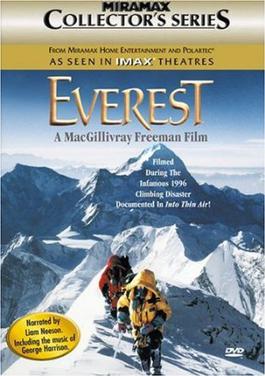“A Testament to God’s Creation”

| None | Light | Moderate | Heavy | |
|---|---|---|---|---|
| Language | ||||
| Violence | ||||
| Sex | ||||
| Nudity |
What You Need To Know:
In 1996, a group of accomplished mountaineers, led by an Emmy Award-winning filmmaker, took a specially-designed lightweight IMAX camera with them to Mount Everest, the world’s tallest mountain. The IMAX film EVEREST is the product of that trip to the summit. This extra-large-screen movie documents the team, their preparations, their personal reasons for climbing, the surrounding area, and the climb itself. The audience sees wonderful mountain vistas, deep gorges, Tibetan villages, and some practices of Buddhism. They also learn about nine climbers from another team who failed and died.
Like TITANIC, the desire to summit Everest is a testament to man’s achievement. This pride can come at a cost, even human life itself. EVEREST demonstrates all of these underlying themes with emotion, awe and dread. It is a technical masterpiece, though not a perfect one. Images from the very top of the mountain do not fill the huge IMAX screen. Nevertheless, the images of crevasses, avalanches, icy blue rocks, and more give testament that God’s creation is beautiful, awe-inspiring and powerful. While God has given man the ingenuity and determination to “do all things,” the fact that lives are still claimed on Everest gives testament that God, not man, is “Master of the Universe.
Content:
(PaPa, FRFR, B, L, M) Pagan worldview of seeking own glory with strong Buddhist elements & revelation of the awesome beauty of God’s creation; one obscenity; no violence but some scary situations; no sex; no nudity; no alcohol use; no smoking; and, a few images of severely frostbitten man.
More Detail:
Like TITANIC, the desire to summit Everest is a testament to man’s achievement. This pride can come at a cost, even human life itself. EVEREST demonstrates all of these underlying themes with emotion, awe and dread. It is a technical masterpiece, though not a perfect one. Images from the very top of the mountain do not fill the huge IMAX screen. Nevertheless, the images of crevasses, avalanches, icy blue rocks, and more give testament that God’s creation is beautiful, awe-inspiring and powerful. While God has given man the ingenuity and determination to “do all things,” the fact that lives are still claimed on Everest gives testament that God, not man, is “Master of the Universe.”


 - Content:
- Content: 
